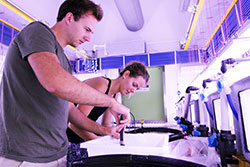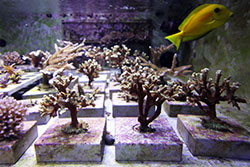Collaborations
AIMS researchers are establishing collaborations with Australian and international colleagues who want to explore the capabilities of the National Sea Simulator facility.
The Western Australian Marine Science Institution (WAMSI) is conducting studies on the impact of dredging on critical life-history stages of coral reef organisms. SeaSim is the only facility in Australia with the level of sophistication, knowledge and expertise capable of developing systems to carry out this critical research.
Access to SeaSim is also part of AIMS's contribution to the National Environment Research Project Tropical Ecosystems Hub, with several researchers examining the effects on marine biota from interactions between water quality and climate change.
Projects
Coral reproduction
A coral breeding system is now providing over 30 000 coral larvae each quarter, helping to provide fresh insights into reproductive strategies in the coral Pocillopora.
Corals normally reproduce once a year but research will not be limited to the natural annual cycles if they can be made to spawn on cue. AIMS is developing aquarium systems with control of photoperiod, thermal regulation and energy budgets to allow scientists to control coral reproduction in an experimental setting.
New small-scale larval rearing systems have been developed in readiness for the annual coral spawning event in the early tropical summer.
Crown-of-thorns starfish
AIMS researchers have developed systems for rearing larvae of the crown-of-thorns starfish, which lets the scientists investigate how water quality affects larval survival and settlement. This will improve our understanding of the factors that influence outbreaks of crown-of-thorns starfish, which AIMS has discovered played a major factor in the decline of coral cover on the Great Barrier Reef.
Ocean acidification
AIMS researchers are trying to understand how reef-building corals of the Great Barrier Reef might respond to a future of continued warming and changing ocean chemistry. Using technology developed for the SeaSim prototype, they are conducting controlled experiments that test the effects of, and the interactions between, thermal stress and increased acidity in seawater on coral growth, physiology and tolerance thresholds. Researchers are also investigating the impact of ocean acidification on sponges and seagrass.



